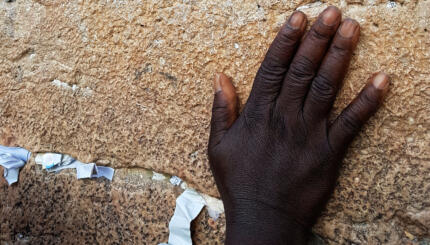Like so many questions in Judaism, the quandary of "Who is a Jew?" has many answers.
According to traditional Jewish sources, if a person is born to a Jewish mother, he is Jewish, regardless of faith or religious observance. A more liberal interpretation accepts patrilineal descent as well, and if a child is born to a Jewish father who is married to a non-Jewish woman, and the couple raises the child in a Jewish home, then liberal Jewish interpretation would accept that child as Jewish.
In Israel, the question of "Who is a Jew?" is especially important as there is no separation between church and state. Weddings as well as funerals are either Jewish, Christian, or Muslim. The issue has become even more timely as 250,000 immigrants from the Former Soviet Union (FSU) who are not Jewish according to halakhah (Jewish religious law) are now living in Israel. These immigrants were accepted under the Law of Return, which allows any prospective immigrant with at least one Jewish grandparent or with a Jewish spouse to be registered as a Jew for purposes of citizenship. These immigrants, therefore, are "Jewish" by nationality, but not according to religious law.
Barred From Lifecycle Events
Because in Israel these newcomers are not considered halakhic Jews–even though they oftentimes experienced anti-Semitism in the FSU–they cannot be married by a rabbi or be buried in a Jewish cemetery. Civil marriage options, such as a proxy wedding by mail or a trip to Cyprus can be arranged, yet they feel themselves ostracized. Especially poignant testimony to their fringe status are the stories of immigrant soldiers, killed during military service in the Israel Defense Forces, who died for their country but must be buried in the non-Jewish section of the cemetery.

Help us keep Jewish knowledge accessible to millions of people around the world.
Your donation to My Jewish Learning fuels endless journeys of Jewish discovery. With your help, My Jewish Learning can continue to provide nonstop opportunities for learning, connection and growth.
Because of their problematic social status as well as for spiritual reasons, hundreds of these immigrants yearly are looking for options of conversion through the Reform, Conservative, and Orthodox movements. But although the Israeli Supreme Court ruled that a person who has undergone a Reform or Conservative conversion abroad must be registered as Jewish, liberal conversions performed in Israel are not recognized by the Orthodox rabbinate (which is concerned that people who convert through the liberal movements have not taken upon themselves full observance ot the mitzvot, or commandments, thereby invalidating their conversions).
As a result these immigrants who face obstacles to lifecycle events find themselves in a bewildering situation, with little space to maneuver. Adding a national dimension to the personal plight of these immigrants are the fears of some that, in combination with the growing population of Israeli Arabs, the existence of this large body of non-Jewish FSU immigrants may threaten Israel’s existence as a Jewish state.
Yet the very groups likely to initiate an organized effort to convert this mass of people–the liberal movements–have had their hands tied. Even though in 1995 the Israel Supreme Court claimed that for the purpose of citizenship and registration as Jews, no basis existed to discriminate against those converted by non-Orthodox clergy, non-Orthodox converts are not accepted as Jewish in matters of personal status like marriage, divorce, and burial.
The Ne’eman Commission
But pressure for a solution continues. In 1998 the Jewish Agency established a committee, chaired by Prof. Yaacov Ne’eman, to decide how to deal with these immigrants who live with the Israeli people and want to be a part of the Israeli people but find the path to conversion fraught with difficulty. The Ne’eman Commission decided that a conversion institute would be established jointly by members of the Reform, Conservative, and Orthodox movements. Teachers would come from all three streams, but the actual conversion would be left to the Orthodox courts.
And so the Institute for Jewish Studies was born, which today offers 500 classes to help encourage Jewish study as well as conversion. These classes educate both Jews and non-Jews (often there is little difference in the knowledge of the two groups). The final step of conversion, however, is moving slowly and is bottlenecked, with only a few hundred FSU immigrants being converted annually.
In another attempt to deal with the FSU immigrants, the Jewish Agency in 2003 launched an accelerated conversion program at Israeli absorption centers in Eastern Europe whose rabbinic conversion courts (batei din) are staffed by Orthodox rabbis who are not accepted by the Israeli Chief Rabbinate. The actual conversions will follow an intensive four-week educational program.
Despite these efforts on the conversion front, the liberal movements believe that the question of "Who is a Jew?" is a time bomb and is widening the gap between native Israelis and immigrants. The seemingly unyielding religious establishment quashes the interest of the immigrants in Judaism, and veteran Israelis harbor distrust of the newcomers. In short, the two groups are fearful of each other.
Interestingly enough, years ago, former Chief Rabbi Ovadia Yosef initiated a lenient conversion process for the Falash Mura in Ethiopia. Assuming that this population in Ethiopia was not Jewish according to halakhah, but knowing that they lived as Jews, Rabbi Yosef decided that the conversion of these people must be a national task. Perhaps as a society, Israel needs to help today’s newcomers today find their path to Judaism as well.


